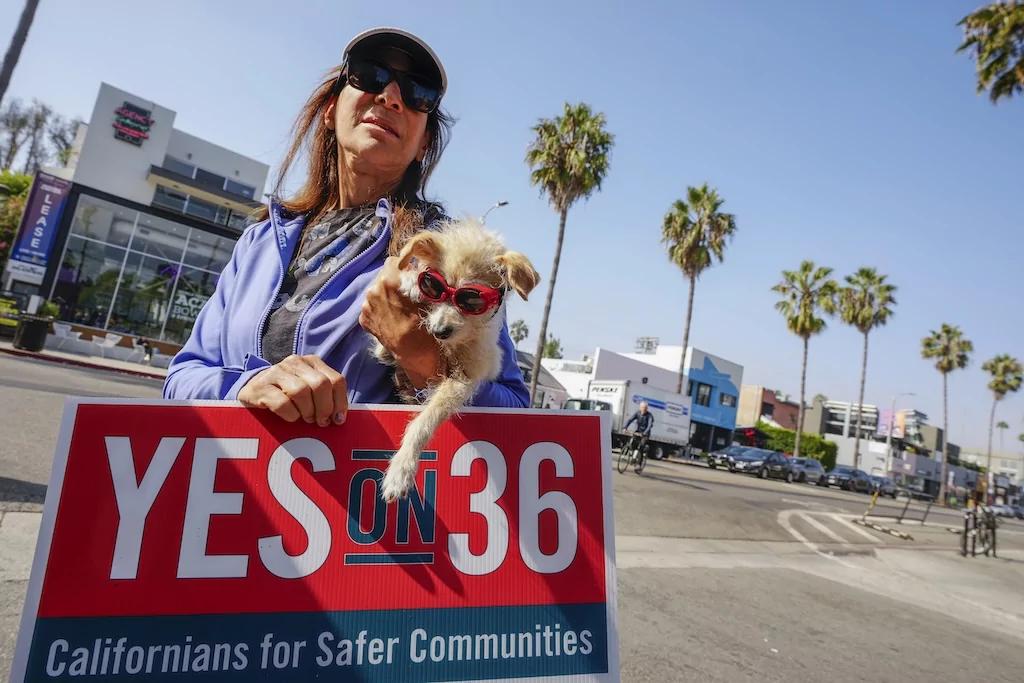
The 2024 elections include a raft of ballot measures across every state. Voters will be asked to mark their preference on controversial topics such as abortion, school choice, the legalization of drugs, and much more. This Washington Examiner series, Direct Democracy, will take a forensic look at several of these items. Previous installments covered measures on abortion, minimum wages, school choice, election laws, and drugs. Part 6 focuses on one-off measures in different states.
Voters across several states are being asked this year to vote on ballot measures related to abortion, minimum wage laws, school choice, election laws, and marijuana.
Some states will also feature unique ballot measures, ranging from animal hunting laws to state flags. Here are some of the matters voters will decide on this election.
Colorado trophy hunting ban
In the Centennial State, voters will decide on whether to ban the intentional “killing, wounding, pursuing, or entrapping a mountain lion, bobcat, or lynx” in the state with Proposition 127.
The measure would also prohibit “releasing of a deadly weapon” on those animals, making either violation a class one misdemeanor under state law with increased fines and limiting wildlife license privileges for convicted criminals.
Neither the Democratic nor Republican Party in Colorado has taken a stance on the measure, but the state Green Party has endorsed the measure.
The group primarily backing the measure, Cats Are Not Trophies, argues that allowing these animals to be killed is unethical, unnecessary, and serving no public good.
“Colorado voters will have an opportunity to halt the inhumane and needless killing of mountain lions and bobcats for their heads and beautiful fur coats,” campaign manager Samantha Miller said in a statement in July. “While the measure stops the recreational trophy hunting and commercial fur trapping of wild cats, it allows lethal removal of any problem animal for the safety of people, pets or farm and ranch animals.”
The proposition has the backing of several groups, including Big Cat Rescue, Carol Baskin’s organization made famous in the 2020 Netflix documentary Tiger King.
The main group opposing the measure, Wildlife Deserve Better, argues that Proposition 127 would “put people, pets, property, livestock, and other wildlife populations in serious jeopardy.”
“Proposition 127 is nothing more than an attempt to uproot science-based conservation strategies in Colorado. If passed by voters in November, this ballot measure would put people, pets, property, livestock, and other wildlife populations in serious jeopardy,” the group claims on its website.
The measure needs a simple majority to pass.
Maine new flag
In the Pine Tree State, voters in the state will decide the fate of the state flag.

Question 5 will ask voters if they wish to replace the state flag, which has been in place since 1909, with a new design that would simplify the flag to a tan background with a blue star on the left and pine tree in the center.
Across the country there has been a trend of changing state flags, with Utah and Minnesota being some of the latest to change theirs.
In 2020, Mississippi residents elected to change their state flag from a design that included the Confederate battle flag to the new design with a magnolia.
The Maine measure got onto the ballot after the flag that was the state flag prior to 1909, which is similar to the design of the newly proposed one, saw popularity around the state’s 200 year celebrations in 2020.
A September Pan Atlantic Research poll showed voters were split 40%-40%, with 20% undecided on whether to change the design of the flag. A simple majority is needed to pass the measure changing the flag.
Rhode Island constitutional convention
In the Ocean State, voters will decide on whether to call a constitutional convention.
Rhode Island is one of more than a dozen states where voters decide on constitutional conventions on the ballot. The state legislature approved a measure putting the question to voters earlier this year, also assembling a 12-member bipartisan preparatory commission to outline changes that could be made during a convention, if approved by voters.
The last constitutional convention in Rhode Island was in 1986. The last vote on a constitutional convention was in 2014, with the measure failing 55.1%-44.9%.
“Rhode Island’s constitution is a living and breathing document that charts the course of our daily lives. We are fortunate that it requires the public’s input every 10 years because that is what true democracy looks like, giving the people a voice to affect significant change,” Democratic state Rep. Robert Craven said in a statement earlier this year. “I don’t know if the residents of Rhode Island will vote to have another constitutional convention, but it’s their right to have the opportunity to make that choice.”
The American Civil Liberties Union of Rhode Island has opposed calling a constitutional convention, arguing that it could hurt civil liberty protections currently in place in the state’s constitution.
“A constitutional convention would open the doors to seriously erode Rhode Islanders’ civil liberties – the same ones we fight to protect every single day. This is not speculation, since it happened in 1986 and there is simply no reason to expect a different result in these polarized times,” the group said.
The measure requires a simple majority to pass.
South Dakota constitution pronouns
In the Mount Rushmore State, voters will decide on whether to change the pronouns in the state constitution to be gender-neutral.
Currently, the state’s constitution refers to a singular officeholder as “he,” in keeping with the traditional usage of the pronoun to be referring to a man or a singular person whose gender is not known (either a man or woman). Amendment E would change several lines in the South Dakota Constitution with the office title rather than the vague pronoun.
“For example, when referencing the Governor, instead of saying ‘he shall be commander-in-chief of the armed forces of the state,’ the text will be changed to read ‘the Governor shall be commander-in-chief of the armed forces of the state.’ The amendment makes similar changes to other references to the Governor, as well as to references to other officeholders including Lieutenant Governor, supreme court Justices, and circuit court Judges,” the attorney general’s ballot explanation said.
The measure was placed on the ballot after the state legislature approved it in March 2023, setting it to appear before voters on Nov. 5, 2024. The vote in the state Senate was unanimous, while the vote in the state House was 58-12.
One of the lawmakers who voted against putting the issue on the ballot, Republican state-Rep. Bethany Soye, believes the change would be “frivolous.”
“Our constitution does not disenfranchise anyone,” Soye said in 2023. “It equally applies to men and women. I think this is a frivolous change and, clearly, women already can rise to positions of authority.”
The measure requires a simple majority to pass.
California toughening penalties for crime
In the Golden State, rampant crime and theft has prompted a ballot initiative aimed at reversing some of the change made with 2014’s Proposition 47.
Proposition 36, which is before voters this November, would allow felony charges for certain drug possessions and thefts under $950 in value for offenders who have two prior similar convictions, while also increasing prison sentences for other drug and theft charges.
The 2014 ballot measure, which Proposition 36 would partially repeal if approved, was billed by supporters as a key part of criminal justice reform in the state and to help with prison overcrowding. It reduced crimes of theft of less than $950 and several drug offenses from felonies to misdemeanors, among other changes.
In recent years, significant drug and retail theft crimes in California have become national headlines.
The Public Policy Institute of California found that shoplifting and commercial burglaries in 2023 were higher than before Proposition 47 passed. Crime increases since the COVID-19 pandemic have helped retail theft numbers spike, with the report finding shoplifting statewide in 2023 was 28% higher than pre-pandemic in 2019, while commercial burglaries in 2023 were 6% above 2019 levels.
Californians have pushed back on the rise in crime, most notably by recalling, in 2022, San Francisco District Attorney Chesa Boudin, a left-wing prosecutor who favored a lenient approach to criem. Other district attorneys accused of being soft on crime are also in trouble in November, with Los Angeles County District Attorney George Gascon polling far behind his opponent. Alameda County District Attorney Pamela Price also appears headed toward defeat in a recall effort.
State Democratic leadership, including Gov. Gavin Newsom (D-CA), have sought to curb retail theft and crime through various initiatives and legislation, but many groups argue the ballot measure is a key part of turning the tide on crime in the Golden State.

Proposition 36 has the backing of the California Republican Party, the California Retailers Association, the California District Attorneys Association, and several Republican and Democratic politicians. San Francisco Mayor London Breed and San Diego Mayor Todd Gloria, both Democrats, have also supported the measure.
“Prop 36 will make our communities safer by creating real accountability for those drug traffickers and criminals who repeatedly steal while also providing meaningful treatment incentives for individuals with mental health and drug addiction issues,” Californians for Safer Communities, the main group supporting the measure, said on its website.
Most of the opposition comes from Democrats, including the California Democratic Party, with the main group opposing the measure, No on 36, claiming it “wastes billions of taxpayer dollars and makes California less safe.”
The measure has the support of a clear majority of California voters, according to various polls, and that popularity caused Newsom, an opponent of the Proposition 36, to prioritize campaigning on other matters on the ballot.
“Prop 36 is a real setback, and it appears clearly that the public has a different point of view,” Newsom said in September.
Going into the November election, supporters of the measure have raised roughly 2.4 times the amount the opposition campaign has raised, according to state records.
Major retailers have contributed the most to the campaign for Proposition 36, with Walmart contributing roughly $3.5 million, The Home Depot contributing $1 million, Target contributing $1 million, and California staple In-N-Out Burger donating $500,000 to the effort to pass the measure.
CLICK HERE TO READ MORE FROM THE WASHINGTON EXAMINER
The most significant donor to the opposition campaign has been Netflix co-founder Reed Hastings’s wife, Patty Quillin, who has donated $2.5 million to attempt to thwart the measure.
Proposition 36 requires a simple majority to pass.






